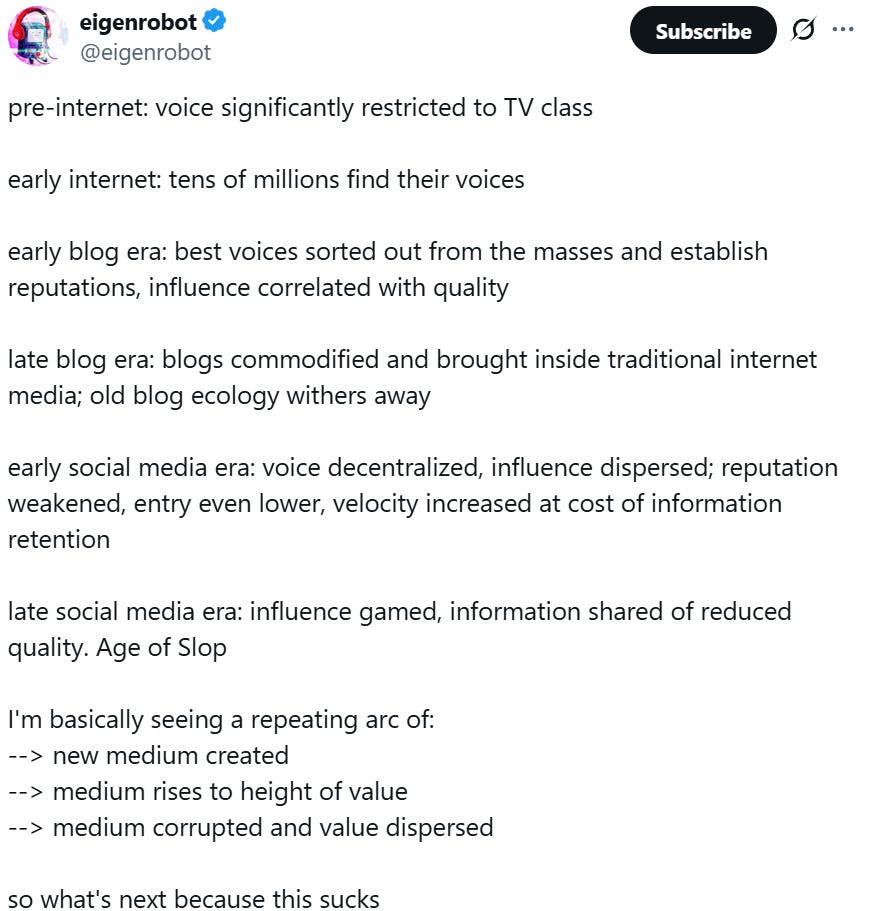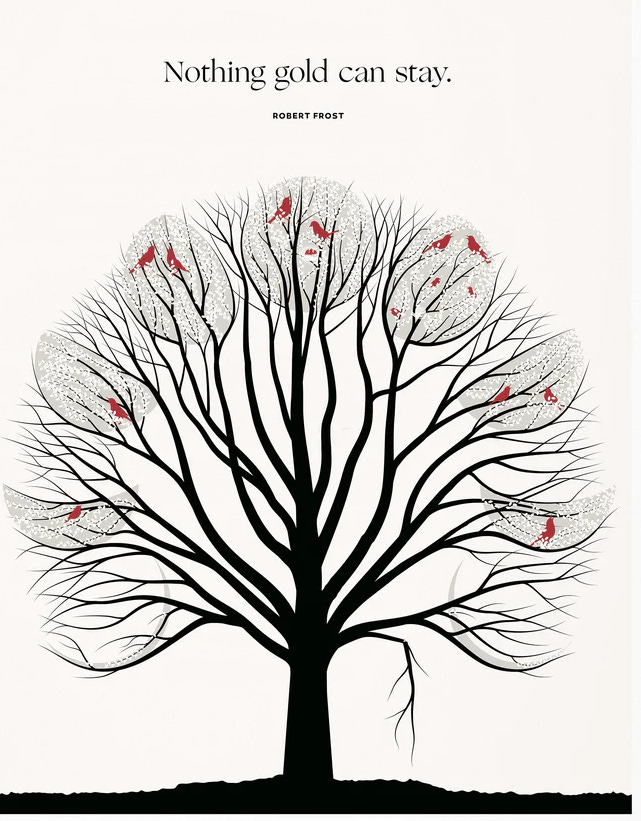The inbound marketing era is ending
Free traffic and attention was a generous and fun window of time, but the party is over
“It is not the strongest of the species that survive, nor the most intelligent, but the one most responsive to change.” — Charles Darwin
Sadly, as many of you already sense, the inbound marketing era is coming to a close. In the late 2000s I wrote several posts on this concept, before HubSpot made it popular and when most companies weren’t doing much here (I used to call it ‘pull marketing,’ but it means the same thing). I wrote one very popular post on how search and social worked together with a simple graphic illustrating the concept that was viewed by a few million people, as at the time it was still a somewhat novel idea. I probably should have built a company around it, but instead I just applied it to my clients, and a bit later went to work at Google.
Anyway, inbound didn’t collapse overnight, it simply turned back into what these types of channels (channels owned by large companies) were in a pre-internet world: a rented audience, delivering ideas at the whim of gatekeepers. It is us, the frog, that has been boiled: with organic traffic and attention drying up, our work used to train AI, our ideas copied and borrowed without links or attribution. The deal has been altered, and not in your favor.
For years, marketers and online creators figured out that if you wrote well enough, optimized cleverly enough, or simply built sufficient content and backlinks, the internet would indeed reward you. Build a blog, build an audience, and search engines would send you the world’s attention on tap. Post something clever on social, and your followers would see it. An unknown artist could share their songs or mixes on Napster and people would actually find them (modern streaming platforms will never recommend them). We thought it would be like this forever, but it was too good to be true. Gatekeepers find a way.
Today, search engines look less like a digital Library of Alexandria and more like private equity inspired toll roads. Organic search is no longer a flowing river of non-paid traffic via 10 blue links, but an cacophony of paid placements, featured snippets, AI summaries, and a dozen other diversions, as search engines run millions of tests to try to find their place in the new world. Even if you rank, you often get the scraps after the engines answer the query themselves or simply point to their own ads. Your future search traffic will be mostly branded queries of people who go to an engine to find you because they already knew you existed, using the engines for navigation.
Social media proved to be even worse. Follower counts might as well not even be real when all they provide is potential reach (if algos decide to show your work). Your community and distribution are now fully mediated by algorithms that serve their own interests and the banality of the crowd. A post can vanish in the churn, no matter how engaged your “audience” claims to be. Ethan Strauss talked about this in his story “this post will not go viral,” and incidentally, I had a hard time even finding it in search. Big tech declared war on hyperlinks and is winning. Incidentally altering the deal to the point we stop doing simple things like share our hyperlinks could ultimately be their undoing, as people decide it’s a bad deal. They could choose to reverse course, of course.
PR and traditional media relations are changing too, my friend Lulu going as far as declaring them dead. Even in the best days, most outlets weren’t in the business of marketing you, they were telling stories that served their own editorial or commercial aims. With constrained newsrooms and shrinking resources, coverage that once came easily or at least occasionally now rarely comes at all. And even if you did land a mention, publications are reluctant to link back, guarding their own brand equity and ad impressions (trad media has always been pretty hostile to the internet). The halo of ‘earned media’ has mostly evaporated, reminding everyone this is attention borrowed, not owned.
The early, generous web, where bloggers and forums linked out freely, and sharing felt cultural rather than transactional, has been thinning for years. Many have abandoned publishing on their own sites and are content to be digital sharecroppers, posting directly to social platforms and letting the value of their words, images, and ideas accrue to the megacorps that run them. The open ecosystem of personal blogs and independent voices has thinned, replaced by streams optimized for engagement metrics that someone else controls. For the purposes of inbound marketing, this leaves continually less referral traffic.

Which leaves email. It lacks the glamour of a viral tweet or a top-ranked search result. But it is one of the last direct, permission-based connections you do, in fact, own. A person gives you their email address and you can reach them, no algorithm in between. Inbox placement is vastly superior and more stable than the roulette of modern discovery platforms. This is a form of push communication, of course, which is the antithesis of inbound marketing — you have to show up, traffic and attention don’t just come to you for work in the past. This is actually a return to form of how marketing used to be. Inbound marketing existing at all is a bit of an aberration, now we’re back to making ads and sending things.
Search, social, PR, etc., can feel important, even indispensable. But the actual percentage of your audience you can reach through them is ever-diminishing, and returning to their natural state: places you need to pay for attention. If they still work for you today, great, they do for everyone a bit too. But you should be actively working to hedge against the changing tides of the internet. You have to work with the assumption whatever alpha remains is going to be clawed back, because chances are, that’s what will happen.
Of course, word of mouth will still exist (and I think will be more important than ever, as it permeates all the gatekeeping of algos since people will text directly and talk in person with friends about products, brands and artists they love). But that’s not really inbound marketing, that’s a natural outcome of having a product or ideas worth sharing. You only earn word of mouth from delivering a great experience.
The collapse of inbound channels was inevitable, as middlemen always consolidate power. The direct line is all that survives. If you want to own an audience today, you have to earn and keep a place in their inbox and build a highly engaged list. The good news is the best marketers, artists and creators have known how to do this for years.




Yes email all we have left. You could also go into detail about how Facebook is killing itself by suddenly banning accounts (where it was once wide enough to give 15 or 30 day bans if a user posted something they didn't want them to post), since they run their company on AI now. We lost two editor accounts for our 1.5 million user anime page, and just lost our Insta account because they can't handle normal, garden-variety anime memes without their AI thinking the content is CP. And this will push more than one company out of business by next year.
Love this, and I preach it to all my clients. Email is the backbone of our marketing, but the content better be genuinely useful.
Throw in a decent website, some earned media (doesn't have to be a ton), paid ads if needed, and maybe 2 social media accounts, and that's a good start.
To be clear, I am talking about for medium-sized advocacy groups, think tanks, or law firms-- not giant pharma or fashion companies. :)